Choosing the Right Hospital Cleaning Partner: Key Operational Factors

Hospital administrators face high stakes when selecting a commercial cleaning company. The cleanliness of a healthcare facility is directly tied to patient safety, infection control, regulatory compliance, and patient satisfaction. Beyond cost considerations, administrators in the U.S. scrutinize a range of operational factors to ensure a prospective cleaning partner can meet the rigorous demands of a hospital environment. This article examines the key criteria hospitals prioritize – from industry-specific experience and staff training to reliability, supervision, and safety – and illustrates these with real-world best practices. By understanding these factors, healthcare leaders can make an informed, confidence-backed choice in their environmental services partner.
Key Factors Hospitals Consider When Choosing a Cleaning Partner
Extensive Healthcare Cleaning Experience
One of the first things hospital administrators look for is proven experience in healthcare environments. Cleaning a hospital or clinic isn’t like cleaning a standard office; it involves specialized equipment, chemistry, and protocols. Practice Managers often ask whether a vendor has a track record with similar sized outpatient medical facilities and should request references from those clients. A company that has worked in hospitals will understand critical issues like preventing cross-contamination, proper infectious waste handling, and minimizing healthcare-associated infections (HAIs) through thorough disinfection of high-touch surfaces.
Reputation and scale matter as well. Providers with a long history and sizable operations instill confidence that they can handle complex, round-the-clock hospital needs. For example, Clean Team, Inc., a janitorial firm established in 1996, has serviced numerous large hospitals, surgery centers, and outpatient facilities across the Midwest. Their client portfolio includes major health systems such as Mercy Health, Ascension, and Nationwide Children’s Hospital – indicating a breadth of experience with the stringent cleaning standards and varied settings that healthcare demands. This kind of industry-specific experience signals to stakeholders that the company is already versed in the challenges of medical cleaning and can hit the ground running.
Rigorous Staff Training and Certification
Because of the sensitive nature of healthcare settings, training for cleaning staff is paramount. Top hospital cleaning contractors don’t just rely on basic janitorial skills; they invest in specialized training programs to ensure every cleaner is prepared for the unique requirements of medical facilities. Proper use of disinfectants, knowledge of isolation room procedures, terminal cleaning, proper handling of biohazardous waste, and personal protective equipment (PPE) usage are just a few areas where training can directly impact patient safety.
In practice, leading companies have structured, multi-tiered training regimens for their employees. Clean Team provides a good example of this best practice: new hires at Clean Team undergo a comprehensive first-day orientation that covers the company’s core values, safety guidelines, proper chemical usage, industry-standard cleaning methods, and customer service principles. This classroom-style introduction (including a multimedia “welcome” series) is then followed by an in-depth, hands-on training period. For three days, new cleaners work on-site under the guidance of a site or area manager to master the specific Scope of Work (SOW) for their assigned facility. This ensures that before they ever work independently, employees can perform all required tasks to the healthcare network’s standards. Clean Team even builds in a continuous improvement step: after training, each employee fills out an anonymous survey about the training quality and their supervisor’s performance, allowing the company to audit and refine its training program over time. Such feedback loops help maintain consistent excellence as the workforce grows.
Another aspect of training is the credentials and certifications held by the management team. Industry leading healthcare networks often favor partners who demonstrate professionalism through industry affiliations and certifications. In the healthcare cleaning arena, this might include affiliations with organizations like ISSA or AHE, or certifications such as Registered Building Service Manager (RBSM) for supervisory staff. Clean Team’s commitment here is illustrative: all of its general managers are required to obtain RBSM certification, a designation that indicates advanced knowledge in managing cleaning operations and up-to-date awareness of best practices for facilities maintenance. Senior managers also stay current through professional bodies (Clean Team’s leadership maintains affiliations and training via BSCAI/ISSA). For medical clients, this translates into a cleaning crew led by people who understand healthcare standards deeply – from handling biohazards to meeting Joint Commission expectations – and who can train and mentor their teams accordingly.
Reliable Staffing and Operational Coverage
Healthcare facilities operate 24/7, and their cleaning partners must be equipped to do the same. Reliability in staffing – having the right number of properly trained cleaners on duty every day without fail – is an operational factor that can make or break a contract. Administrators will examine whether a cleaning company has the capacity and systems to guarantee coverage for all shifts, including contingencies for sick calls or surges in cleaning needs.
To meet these expectations, the best commercial cleaning firms maintain a robust workforce and proactive staffing strategies. Clean Team, for example, employs over 2,000 W-2 employees across its branches – a non-union workforce deliberately kept large enough to staff even very large facilities without strain. This depth gives them a buffer to cover vacations, absences, or new service requests on short notice. They also designate a Staffing Coordinator role in each local branch to continually recruit, screen, and onboard staff, even in advance of openings, which helps ensure there is always a pool of trained cleaners ready to step in.
Equally important is operational planning. Prior to starting service at a hospital, a capable vendor will have a detailed startup process to organize personnel, supplies, and workflows. Clean Team’s internal protocol includes a 30-day pre-startup process led by a dedicated launch team. During this period, they map out logistics so that when Day One of the contract arrives, every shift is covered, every cleaner knows their assignment, and equipment and supplies are in place. This level of preparation speaks to reliability – it’s essentially a guarantee never to miss a day of service. Moreover, Clean Team mandates practical measures to uphold dependability: for instance, every employee must hold a valid driver’s license and auto insurance, ensuring they have reliable transportation for the job.
Technology can further bolster staffing reliability. Modern time-tracking systems allow real-time verification that staff are on-site and on-time. Clean Team uses a geofenced electronic timekeeping system (Chronotek) that requires cleaners to clock in physically at the facility location. This system immediately flags any no-show or late arrivals so that supervisors can respond and deploy backup if needed. For a hospital administrator, these operational safeguards – from extra float staff to startup checklists to timekeeping sytems – translate into peace of mind that the facility will be cleaned consistently every day, without excuse.
Supervisory Oversight and Quality Assurance
Even with well-trained staff in place, continuous oversight and quality assurance (QA) are critical factors for success in a medical facility. Best practices in the industry call for a layered management structure dedicated to oversight. In practice, this means having local or on-site supervisors who manage day-to-day cleaning teams, plus regional managers who provide another level of accountability and client interface. Clean Team exemplifies this structured approach: each regional branch is led by a General Manager who acts as the client liaison and ensures high-level oversight, supported by an Operations Manager who focuses on the execution of services. These managers conduct regular site walkthroughs and audits to confirm that the cleaning specifications (Scope of Work) are being followed to meet and exceed client expectations.
In addition, Clean Team assigns Area Managers or Site Supervisors to larger accounts like hospitals; their role is to be on the ground with the cleaning staff, providing hands-on guidance and immediate correction or retraining if any aspect of service falls short. This on-site supervision means issues can be caught in real-time – for instance, if a spill was overlooked or a particular high-touch surface missed, a supervisor can address it before it becomes a complaint.
A rigorous QA program goes hand-in-hand with strong supervision. Leading hospital cleaning providers implement formal inspection routines and use metrics to track performance. Clean Team uses technology and scheduled evaluations to ensure no detail slips through the cracks. Supervisors and operations managers perform weekly audits of cleaning quality, logging their findings in a centralized software platform (CleanTelligent). This digital QA tool allows them to document any issues, assign corrective actions, and analyze trends over time. Importantly, the data is shared with the client: Clean Team provides hospitals with access to reports of these inspections, offering full transparency into service levels. Additionally, they engage hospital administrators in regular review meetings – often quarterly – where they present performance scores across key criteria (staff professionalism, cleaning quality, communication, etc.) and even ask the client to grade their service. In these meetings, any score below a top tier is addressed with an action plan for improvement.
Compliance, Safety, and Employee Vetting
Hospitals, Surgical Centers, and Medical Office Buildings (MOBs) place enormous trust in the cleaning crews that work in their halls every day. These workers often have access to patient areas, expensive equipment, and sensitive information. Therefore, Environmental Health and Safety (EHS) heavily weighs how a cleaning company addresses safety, compliance, and employee vetting.
Background checks and vetting of staff are non-negotiable in medical facilities. Reputable cleaning companies will conduct thorough criminal background screenings for all employees before they set foot in a hospital. Many healthcare networks also prefer or require that cleaning staff be direct employees of the vendor (W-2 employees rather than third-party subcontractors), which typically allows for more rigorous hiring and oversight. Clean Team, for instance, maintains a policy of hiring W-2 employees and performs nationwide criminal background checks on each of them. All team members are also drug-tested where relevant and verified to be eligible to work. Furthermore, all Clean Team employees are bonded and insured. Clean Team can also easily add any client onto their Certificate of Insurance (COI) to be listed as additionally insured for peace of mind at no additional cost.
Beyond vetting, regulatory compliance and training in healthcare protocols are a key part of operational due diligence. Practice Managers and Registered Nurses (RNs) with a stake in the housekeeping standards will check that a cleaning company is well-versed in standards like OSHA regulations (for handling bloodborne pathogens and hazardous materials), HIPAA considerations (to safeguard patient privacy during cleaning routines), and any state or federal healthcare cleanliness guidelines. Clean Team underscores its compliance credibility by engaging with industry associations (such as ISSA and BSCAI) that keep their staff up-to-date on the latest healthcare cleaning standards.
Communication and Responsiveness
Finally, hospitals look for a cleaning contractor that will be a true partner – one that communicates well and responds quickly to the dynamic needs of a healthcare environment. Conditions in a healthcare facility can change on a dime: an emergency spill, a sudden influx of patients, or an outbreak of illness can necessitate immediate cleaning attention or adjusted routines.
The best cleaning companies set themselves apart with proactive communication and an agile service attitude. For example, Clean Team builds frequent client communication into its operating model. They arrange weekly check-in meetings with hospital facility managers or EVS directors to walk through the facility together, discuss any issues or upcoming needs, and ensure alignment in expectations. These standing meetings mean that concerns are addressed before they escalate and that the cleaning plan can be tweaked in real time based on feedback. In addition to routine touchpoints, Clean Team conducts formal quarterly reviews with their healthcare clients to take a broader look at performance trends and to plan for any larger adjustments.
Crucially, a competent vendor remains on-call and ready to respond outside of scheduled meetings. Clean Team exemplifies this by providing 24/7 on-call availability – hospital clients know they can reach a company representative at any hour for emergencies. If a patient room needs a rapid terminal clean in the middle of the night or if a last-minute staffing change is required, the cleaning partner is just one phone call away and prepared to act.
Conclusion
Selecting a commercial cleaning company for a hospital’s housekeeping needs is a decision that extends far beyond who can mop the floors for the lowest price. Hospital administrators are effectively entrusting an external team with a critical aspect of patient care – a clean and safe environment – and they must weigh that choice with care. The operational factors discussed above form a checklist of what savvy administrators focus on: demonstrated experience in healthcare settings; comprehensive training and well-qualified staff; rock-solid staffing and reliability measures; robust supervision and quality control processes; strict compliance and vetted, trustworthy personnel; and a communicative, responsive service approach.
Cleaning companies that excel in these areas naturally rise to the top. They show, through their practices and track record, that they understand the unique demands of healthcare and can seamlessly integrate into a hospital’s operations. Clean Team, Inc. is one example of a provider that exemplifies many of these best practices – from its investment in training and oversight to its depth of healthcare experience – offering a real-world case study of what hospitals should look for in a partner. Ultimately, when a hospital selects a cleaning contractor that meets these criteria, it sets the stage for a productive partnership. The administrators gain confidence that their facilities will be maintained at the highest standard of cleanliness, and they can devote their attention to other aspects of hospital management. Patients and staff, in turn, benefit from a safer, healthier environment. In an industry where lives are on the line, choosing a cleaning partner with strong operational capabilities is not just prudent – it’s essential to supporting the hospital’s mission of quality care.
Proven Results in Healthcare Facilities
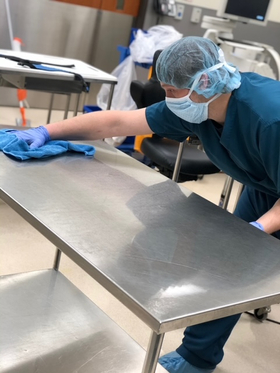
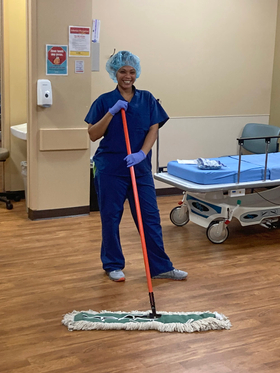
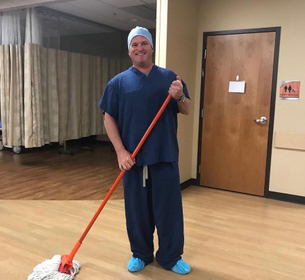
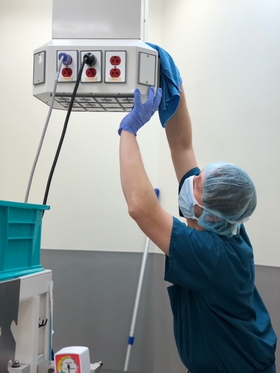
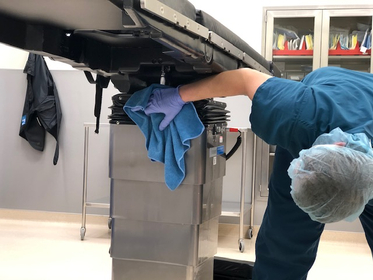
Partner With a Trusted Healthcare Cleaning Provider
Clean Team has the experience, training, and resources to safeguard your environment while supporting compliance and patient safety. Let’s discuss how we can meet your facility’s unique needs.
